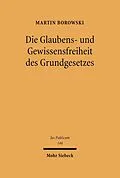The basic right to freedom of religion and conscience is at the centre of a great number of fundamental conflicts, such as, for example, whether a crucifix in the schools, the religious headscarf worn by Moslem teachers or ritual butchering ought to be allowed. Martin Borowski reconstructs this complex, which has been greatly influenced by tradition, against the backdrop of the findings of the modern views on fundamental rights.
The basic right to freedom of religion and conscience is found at the center of a great number of fundamental conflicts, such as, for example, whether a crucifix in the schools, the religious headscarf worn by Moslem teachers or ritual butchering ought to be allowed. Structural peculiarities in freedom of religion and conscience and their relation to the articles in the German Basic Law on the law of church and state are a special challenge to the legal scholar. Martin Borowski reconstructs this complex, which has been greatly influenced by tradition, against the backdrop of the findings of the modern views on fundamental rights. This includes an exact analysis of the relationship between fundamental constitutional rights and the authorization given by the law of church and state, the collective and the individual aspects of freedom of religion, a detailed study of the definition of 'religion' and of the boundaries of freedom of religion and conscience.
Autorentext
is Professor for Public Law, Constitutional Theory, and Legal Philosophy at the University of Heidelberg.
The basic right to freedom of religion and conscience is found at the center of a great number of fundamental conflicts, such as, for example, whether a crucifix in the schools, the religious headscarf worn by Moslem teachers or ritual butchering ought to be allowed. Structural peculiarities in freedom of religion and conscience and their relation to the articles in the German Basic Law on the law of church and state are a special challenge to the legal scholar. Martin Borowski reconstructs this complex, which has been greatly influenced by tradition, against the backdrop of the findings of the modern views on fundamental rights. This includes an exact analysis of the relationship between fundamental constitutional rights and the authorization given by the law of church and state, the collective and the individual aspects of freedom of religion, a detailed study of the definition of 'religion' and of the boundaries of freedom of religion and conscience.
Autorentext
is Professor for Public Law, Constitutional Theory, and Legal Philosophy at the University of Heidelberg.
Titel
Die Glaubens- und Gewissensfreiheit des Grundgesetzes
Autor
EAN
9783161580390
Format
E-Book (pdf)
Hersteller
Digitaler Kopierschutz
Adobe-DRM
Dateigrösse
70.73 MB
Anzahl Seiten
871
Lesemotiv
Unerwartete Verzögerung
Ups, ein Fehler ist aufgetreten. Bitte versuchen Sie es später noch einmal.
